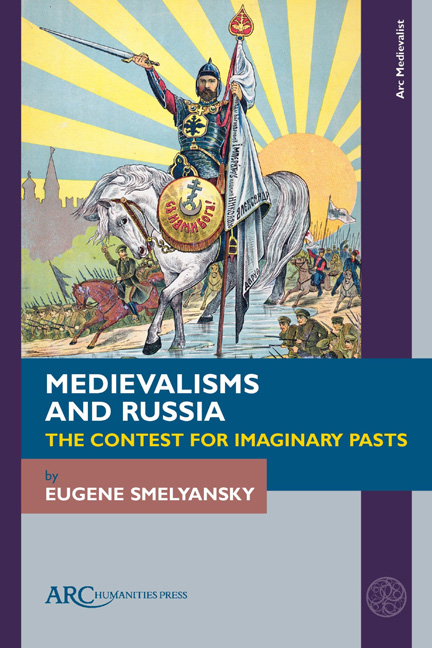Book contents
- Frontmatter
- Contents
- List of Illustrations
- Acknowledgements
- Names, Transliteration, and Abbreviations
- Introduction
- Chapter 1 A Contested Inheritance: Medieval Rus and Russia’s Origin Myths
- Chapter 2 Alexander Nevsky: The Once and Future Prince
- Chapter 3 Byzantine Dreams: Russia as the “Third Rome”
- Chapter 4 Medievalism as Allegory: The Middle Ages in Unofficial Culture
- Conclusion
- Select Bibliography
- Index
Chapter 3 - Byzantine Dreams: Russia as the “Third Rome”
Published online by Cambridge University Press: 08 May 2024
- Frontmatter
- Contents
- List of Illustrations
- Acknowledgements
- Names, Transliteration, and Abbreviations
- Introduction
- Chapter 1 A Contested Inheritance: Medieval Rus and Russia’s Origin Myths
- Chapter 2 Alexander Nevsky: The Once and Future Prince
- Chapter 3 Byzantine Dreams: Russia as the “Third Rome”
- Chapter 4 Medievalism as Allegory: The Middle Ages in Unofficial Culture
- Conclusion
- Select Bibliography
- Index
Summary
IN EARLY AUGUST 1991, just days before the failed hardliner August Coup which led to the collapse of the Soviet Union, Moscow hosted the Eighteenth International Congress of Byzantine Studies. A small group of scholars, including a prominent Harvard Byzantinist of Ukrainian origins, Ihor Ševčenko (1922–2009), even met with the then-Soviet vice-president Gennady Ianaev (1937–2010) at the Kremlin. According to Ševčenko, Ianaev—the leader of the impending coup—was a cordial host but asked his guests a surprising question: “Was there totalitarianism in Byzantium?” At the time, Ševčenko replied that the Byzantine rulers might have desired a high level of control over their subjects but lacked the means. Ianaev's question later inspired him to research a more detailed (although, ultimately similar) answer.
Why was the vice-president of the Soviet Union concerned about totalitarianism in a long-gone empire? Did he wonder if the Byzantine Empire could have prolonged its life, had it embraced more hardline politics? After all, Ianaev and his co-conspira-tors attempted to preserve the USSR by doing just that. Ševčenko does not elaborate, but this anecdote illustrates the degree to which Soviet and Russian ruling elites remain deeply intrigued by Byzantium, occasionally seeing it as a source of legitimacy, an inspiration for Russia's imperial ambitions, and even a model. The Principality of Moscow began to consolidate power and expand in the fifteenth century, nearly simultaneously with the demise of the Byzantine Empire. This coincidence inspired many later Russian authors, political theorists, and theologians to see their country as Byzantium's heir, although there is much disagreement about the exact nature of this inheritance. This chapter will analyze these appeals to the Byzantine heritage and, ultimately, the Byzantine Empire's role in Russia's history and memory. Like the examples of medievalism discussed in previous chapters, different narratives related to the myth of Russia's Byzantine inheritance—sometimes expressed as the statement “Moscow is the Third Rome”—are used to legitimize Russia's own imperialism, its close cooperation between its secular rulers and the ROC, and its self-styled opposition to the West.
An Unexpected Lesson: The Fall of an Empire (2008)
As Chapter 2 has demonstrated, 2008 was an important year for medievalism in the Russian media.
- Type
- Chapter
- Information
- Medievalisms and RussiaThe Contest for Imaginary Pasts, pp. 67 - 88Publisher: Amsterdam University PressPrint publication year: 2024

